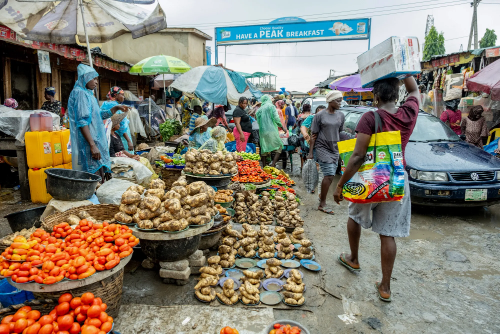Nigeria’s Inflation Slows to 23.7% in April as Core Pressures Ease

TLDR
- Nigeria’s headline inflation slowed to 23.71% in April 2025 from 24.23% in March, according to data from the National Bureau of Statistics
- The moderation was driven by easing food and core inflation, alongside a decline in monthly inflation to 1.86%, down sharply from 3.90% in March
- Despite the moderation, analysts note that elevated energy, telecom, and import costs—fueled by past naira depreciation—remain key inflationary risks
Nigeria’s headline inflation slowed to 23.71% in April 2025 from 24.23% in March, according to data from the National Bureau of Statistics. The moderation was driven by easing food and core inflation, alongside a decline in monthly inflation to 1.86%, down sharply from 3.90% in March.
Food inflation fell to 21.26% year-on-year—significantly lower than the 40.53% recorded in April 2024—due to improved supply, softer demand, and statistical base effects. Core inflation, which excludes food and energy, also cooled to 23.39% from 26.84% in April 2024, with monthly core inflation slowing to 1.34%.
Despite the moderation, analysts note that elevated energy, telecom, and import costs—fueled by past naira depreciation—remain key inflationary risks. As of May 15, 2025, the naira appreciated to ₦1,599.33/$1 in the official market, up 0.62% on the week. However, the currency weakened slightly in the parallel market, trading between ₦1,620 and ₦1,630/$1, reflecting ongoing dollar scarcity and access issues for smaller firms and individuals.
Daba is Africa's leading investment platform for private and public markets. Download here
Key Takeaways
The latest inflation data and relative naira stability could influence the Central Bank of Nigeria’s decision at the May 19 Monetary Policy Committee meeting. After consecutive rate hikes to contain inflation and support the naira, some analysts expect the CBN to pause or adopt a measured tone. The MPC may hold rates to assess the inflation trend and maintain investor confidence. However, risks persist. Any renewed pressure on the naira or global commodity shocks could reverse the recent inflation slowdown. Overall, the April data suggests inflation is easing, but not decisively. Structural drivers—particularly import-related costs, FX liquidity, and energy prices—will continue to shape the near-term outlook.

Next Frontier
Stay up to date on major news and events in African markets. Delivered weekly.
Pulse54
UDeep-dives into what’s old and new in Africa’s investment landscape. Delivered twice monthly.
Events
Sign up to stay informed about our regular webinars, product launches, and exhibitions.




